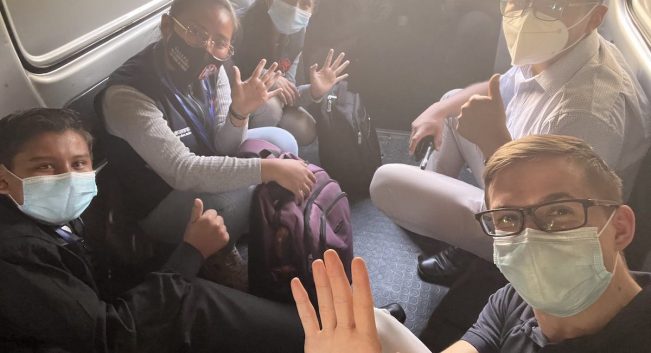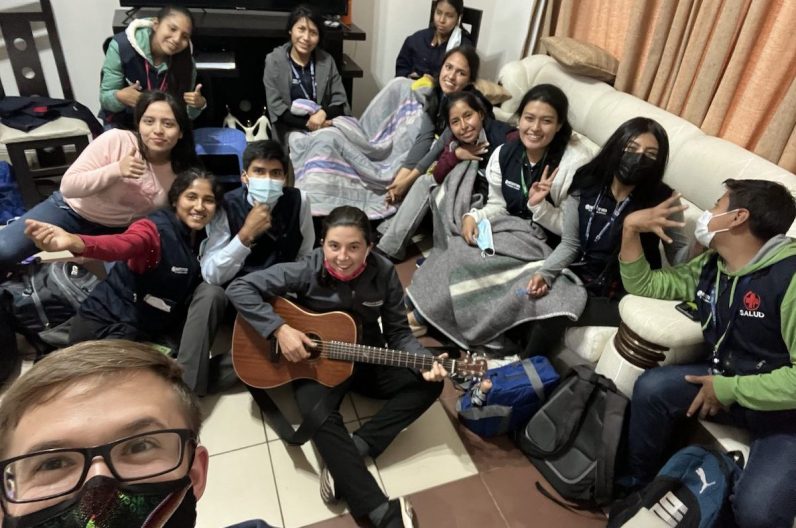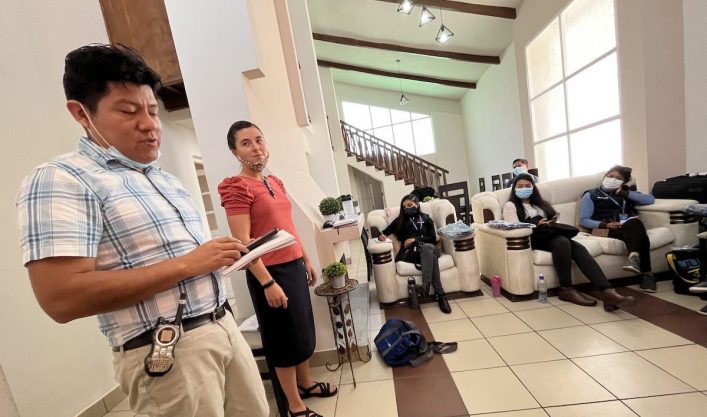"Sharing Hope in Bolivia"
Seth Roberts | Associate Literature Ministries Director | May 1, 2022

Esta bien?
I know maybe 10 Spanish words and none of them were helping me much. I was in the middle of South America, accompanying a student literature evangelist (LE) who didn’t speak English, and being transported from street to street by a driver who I could only communicate directions to using hand signals.
How’d I end up here?
A few days prior, I had arrived in Cochabamba, Bolivia, with David Pano, Michigan Conference’s Literature Ministries director, and Emily Duffield, business manager for SOULS West, an evangelism training school in Arizona. We were there to train a team of Bolivian student LE’s to canvass in a different way than they’d been taught before. Partnering with the Central Bolivian Mission’s Publishing department, we wanted to explore ways to improve their canvassing training methods.
The idea for the trip originated in a series of conversations between Pano and the officers of the Central Bolivia Mission in early 2021 about how they could improve their evangelistic training. Pano, a native of Bolivia, left South America for the United States over a decade ago, but has still kept in touch with his college classmates, a number of whom now fill administrative roles within the Bolivian Union.

"Since coming to the United States,” Pano shared, “I’ve learned a lot from our church’s organizations about how to conduct our evangelistic work more effectively. I want to make these resources available to conferences overseas, so they can benefit from what we have learned and built here.” Pano shared about the Michigan Conference’s Emmanuel Institute for lay training, and the Youth Rush structure for student canvassing training. Intrigued, the Central Bolivian Mission’s leaders traveled to Michigan to learn more.
After their visit to Michigan, the Central Bolivia Mission officers arranged with Pastor Esteban Vera, the Mission’s Publishing Director, to prepare a group of new student LE’s that a team of leaders from Michigan could train according to the methods used in our Youth Rush programs.
There was just one problem: There was no funding available to make the project a reality. With limited options, the Literature Ministries department turned to an innovative tool they had used for a number of years to fundraise for various mission projects: the Canvassing for Missions initiative, where Youth Rush students can elect to donate 100% of their earnings from one canvassing day in the summer to a specified mission project.
During the 2021 Youth Rush program, Pano presented the Bolivia project to the students. Including some additional donations from other sources, over $4,000 was raised to make the Bolivia project a reality.
As a result of the preparatory work done by Michigan’s Literature Ministries department and the Central Bolivia Mission, David Pano, Emily Duffield, and I travelled to Cochabamba, Bolivia, in mid-December 2021. We arrived to a very warm welcome by the local church leadership and, after a restful weekend, began the work of training a team of 16 new canvassers how to reach their community for Jesus.

We ran into some challenges in our work, primarily the language barrier. Unlike David, who speaks Spanish fluently, both Emily and I faced a significant obstacle when communicating with the students. While we had varying degrees of success in working around it (including having a translator on-site for the bulk of our time there), we found it quite difficult to train canvassers in the field. Over time, we learned to observe body language, identify key phrases, and quiz students after each interaction about what took place, in order to effectively provide training feedback.
As the days carried on, we began to see a slow but steady improvement in the canvassing ability of the students, as they applied their training and learned how to meet the needs of the community. As we worshipped together each morning, we began to hear powerful testimonies of how God was using each student to reach souls for His kingdom.
By the time the three-week program came to an end, it was clear that all involved had experienced a rich blessing in their work. As Emily put it, “The greatest blessing I received from the [Bolivia] trip was being able to genuinely bless and invest in the 16 young people we trained there. It was fun to see them improve in their canvassing skills, but seeing their joy in being able to reach others for Jesus was the most rewarding part of all.”
